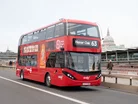End-to-End Solution Behind First Fully-Electric Bus Route

Known as one of the world’s top smart cities, London is no stranger to leveraging technology to keep its transport networks running efficiently to benefit both its users and the planet.
Mayor of London Sadiq Khan is working to ensure the city reaches its zero carbon goal by 2030 alongside a transport strategy that aims for 80% of journeys to be made by walking, cycling or public transport by 2041.
This also includes a commitment to deliver a 100% zero-emission bus fleet in London by 2034.
This shift represents a significant leap in climate technology, showcasing how major cities can tackle air pollution and reduce carbon emissions through innovative public transport solutions.
About Route 63
One of London’s busiest bus routes, Route 63 ferries thousands of people between Honor Oak and King's Cross each day.
In 2021, Route 63 underwent a significant transformation in what is now seen as a milestone in the city’s transition to sustainable public transportation, with London bus company Transport UK London Bus (TULB) introducing a fleet of 29 Alexander Dennis Enviro400EV electric double-decker buses.
Now, Transport UK London Bus has fully electrified the service in collaboration with Siemens and its financing arm, Siemens Financial Services.
This partnership now means the fleet of 29 electric double-decker buses at the Walworth depot in London that serves this route are supported by power infrastructure, maintenance and charging facilities — with enough power to keep the fleet running throughout the day.
John Eardley, Managing Director at TULB, says: “With the strength of financial support through Siemens Financial Services, Transport UK London Bus was able to build its electric fleet, including depot, charging infrastructure and grid connection, while minimising capital expenditure.”
The Enviro400EVs feature zero-emission powertrains, which significantly reduce the route's carbon footprint and improve air quality along its path.
Electrifying bus routes and powering London's eMobility revolution
Transport for London (TfL) has made remarkable progress in electrifying its iconic red bus fleet.
Of its fleet of 9,000 buses, more than 1,600 zero-emission buses operate on the capital’s streets, making London one of the largest electric bus fleets in Europe.
Sadiq Khan says: “London has a world-class public transport network and our zero emission bus fleet is setting the standard for others to follow.
“I'm committed to cleaning up London's air achieving net-zero carbon by 2030 and that includes delivering a zero-emission bus fleet.
“The decarbonisation of our bus fleet… will help build a better, greener London for all.”
This transition is a crucial part of London's strategy to improve air quality and reduce the environmental impact of its transportation sector.
The city's largest bus operator, Go-Ahead London, reports that its electric buses have saved approximately 40,000 tonnes of carbon dioxide emissions over a decade of operation.
This substantial reduction in greenhouse gases is a clear demonstration of how climate tech solutions make a positive impact in urban environments.
Siemens says of its collaboration to electrify London buses: “Today, Siemens is responding to the challenges of tomorrow with powerful, interoperable and scalable charging infrastructure solutions for electric vehicles.
“We truly believe that eMobility is crucial to achieve global climate goals, but achieving this is only possible within an ecosystem of partners who share our mission.”
With IoT-connected hardware, software and services for alternating current (AC) and direct current (DC) charging — ranging from 7kW to 1MW — Siemens solutions are ensuring energy, building and transportation networks are smart, interconnected and interoperable.
The impact of electrifying bus routes
The International Energy Agency (IEA) says electric buses pave a path to lower urban emissions and a sustainable future, with its research showing that globally in 2023, 50,000 electric buses were sold, equivalent to 3% of total bus sales that year.
This brings the global stock of electric buses to approximately 635,000.
The global electric bus market was valued at US$29bn in 2021, with it expected to grow to US$105bn by 2028.
The electrification of bus routes also represents a significant advancement in climate tech and sustainable urban transportation.
The agency is steadfast in the belief that electrification of road transport goes beyond cars, noting ambition in the EV space is growing and evolving to meet growing need.
IEA Executive Director Fatih Birol says: “Electric vehicles are one of the driving forces in the new global energy economy that is rapidly emerging. By 2030, EVs will avoid the need for at least five million barrels a day of oil. Cars are just the first wave: electric buses and trucks will follow soon.”
Receive the next edition of ClimateTech Magazine by signing up for its newsletter.
As part of this portfolio, make sure you check out Sustainability Magazine and also sign up to our global conference series - Sustainability LIVE.
Also check out our Sister Brand, Energy Digital.


